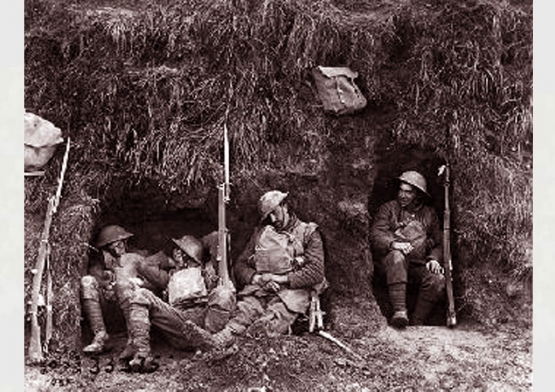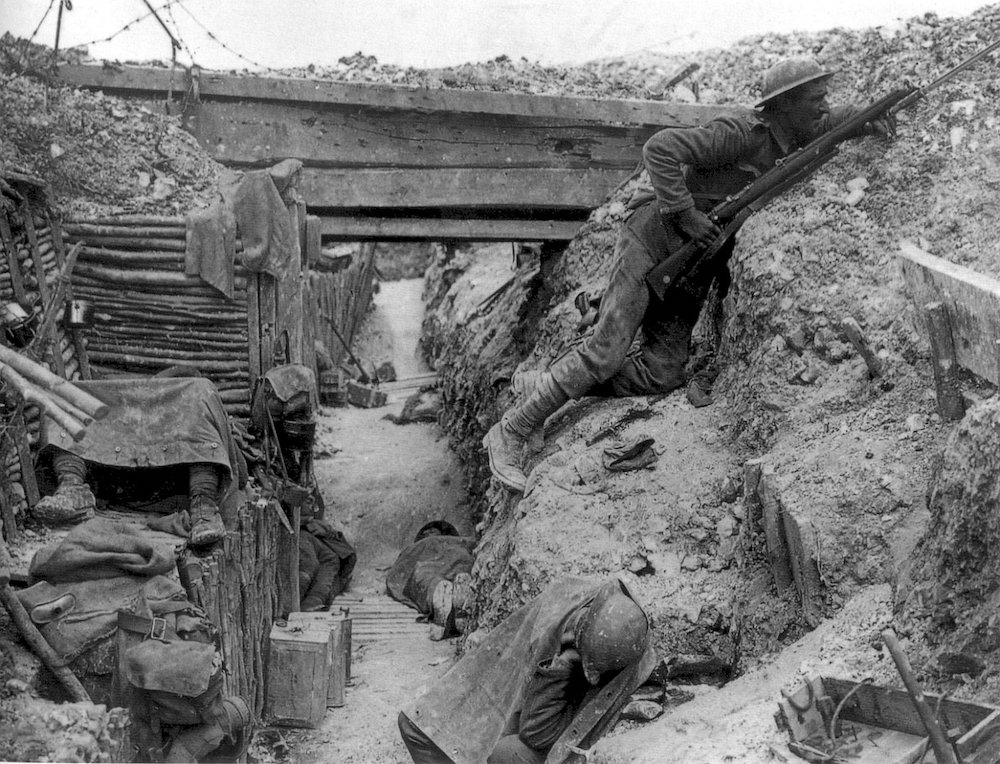Part IIThe season of the first cherries has begun. Sometimes a farm girl comes all the way to our positions, saying she has fruit to sell, but no one has a penny here, so they push and pull till all of the protesting girl's merchandise has been knocked out of her hands. One day when a few of the lads are feeling under her skirts and rubbing up against her coat and she starts to scream, I threaten them with punishment and smack them on the head. To my surprise, they instantly turn meek and back off. My heart goes out to the lads, who have nothing to occupy their minds here, while I often sit and read the few French books that the newspaper vendor has brought for me. Occasionally an officer gives me something to read as a token of gratitude for my unit's discipline. In the gloaming, when nostalgia strikes, we sing the songs we remember sotto voce; the infantryman Laurent Mordin from Charleroi, who studied music, teaches us to sing notes that go together in chords. It sounds so lovely; he says that after the war we'll start a big choir, and everybody takes him at his word. Until the next patrol, when we have to leave yet another tenor voice behind in the barbed wire, shrieking. We sneak out at night to drag the victim into a shallow pit like an animal, glad that at least we can bury him, but not until we have stripped him down to his underwear, taking everything that might still come in handy. We turn tough and get sentimental; we laugh as we cry; our life's a waking slumber, a slumberous wake; we quarrel with our arms around each other; we lash out at each other while shrugging our shoulders; no part of our bodies or minds remains intact; we breathe as long as we live, and live merely because we are breathing, as long as it lasts.Hicketick, a soldier from Antwerp who has served since the start of the war, used to be a cook in an officers' mess; now he lies here grousing about the filthy crap we eat. Sometimes he slips away and returns with a wood pigeon, a stray chicken, or a pheasant. Then he scrapes the lard off a couple of slices of bread, builds a fire behind an earthen wall far behind our trench in the dusk, and fries the chunks of meat in the lid of his pan, until we go wild with craving and beg for a bite. After we chew and swallow, the flavor lingers like a nagging hunger for more; we munch on our bread and drink the weak beer that the supply base now sends us at irregular intervals.
I feel a powerful urge to write everything down, but I don't have time. Sometimes I daydream about how we could possibly get out of this, or I sketch with the charred tip of a dry twig. Drawing soothes me. The lads keep their distance then, showing a kind of reverence. So I tend to go off on my own toward nightfall, which comes early to the dispirited landscape. I draw the bare tree stumps where once the lanes were overhung with green; the protruding shaft of a covered wagon in a crater; the remains of a roof, which looks like a sagging wigwam; a ruined wall, overgrown with grass and stinging nettles. Clods of turf hang from a tile batten jutting out from a collapsed roof, looking like impaled heads in the twilight. I shudder and commit the scene to paper. A flock of partridges passes overhead, filling the air with their staccato cries of "roof-roof." Somebody shoots one out of the sky; a few seconds later, the artillery lets loose an ear-splitting volley; we duck as earth flies everywhere; inane laughter spreads through our ranks, foolish chortling and giggling because we've squeaked by yet again. Look, Hicketick says, there are two partridges on that wall. Martien, who's going to shoot them, you or me? You have to hit both with one shot or you'll lose them. I aim and fire; the birds seem to dive away; a salvo comes screeching in my direction; I lie flat till it's over. The Germans are getting tired of this game too; they fire distractedly, as if out of habit. Hicketick curses; I creep through the half-light to find them; one partridge is dead, the other still twitching. I pull off their heads and crawl back. Hicketick tells me we can't cook them straight away. It takes a couple of days for the meat to soften. I shrug and stuff the birds into a dead pal's mess tin.
I head off with five of my men to keep watch at the most forward post; twenty-four hours of vigilant observation, noting any changes in the German positions. We are lying so close together that we can hit each other with pebbles. Even when we see a spiked helmet surface above the wall, we don't shoot. There's no point in provoking serious combat here; it would only cost us all our heads. But toward nightfall, when a German unexpectedly throws a grenade that goes off close to our dugout, I lose my temper. I grab one of our grenades, pull out the pin, and throw it furiously in their direction. We stop up our ears and wait for the explosion. Nothing. And then - - - nothing. We wait in disbelief; the grenade must have landed right next to their forward post without going off. Once darkness falls, I send one of the lads out to have a look. A moment later, we hear a boom, followed by a furious blast of rifle fire, screams and cries from the other side and our own, shells flying back and forth. We run for our lives, away from the German trenches. After ten minutes, everything is quiet again. An owl cries in the tilting trunk of a willow beside a drainage ditch that gleams in the vague moonlight. The boy I sent ahead did not return; his death is on my conscience. I order my men to reoccupy the forward post as quietly as they can, while I crawl over to the dead soldier's body. I am so close I can hear the Germans talking. My heart pounds in my throat. I try to drag the boy back through the mud, but it proves impossible. His whole chest has been shot open; he is lying on his back. I cautiously take his rifle and ammunition and make the sign of the cross on his forehead.
Gobbleskipya, I hear in my head. Gobbleskipya, pal, God damn it.
I return to my place among the men in the dugout. Their disapproval takes the form of a crushing silence. Stiff with cold and damp, we are relieved ten hours later.
Back in the trench, I see Hicketick gain. He asks me where the partridges are. I open th mess kit and out comes a sharp stench. Twenty-four bloody hours and they're already rotten, he says. Maggots writhe in their sunken eyes.
"I'll stew them up for the officers, with a whole bottle of red wine," he says with a wink, and then he's gone.
It is May 1915, Le vintième siècle writes. Still quiet on the Belgian front.
--- From War and Turpentine
Stefan Hertmans
©2006 Pantheon Books

